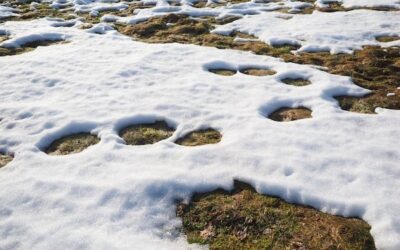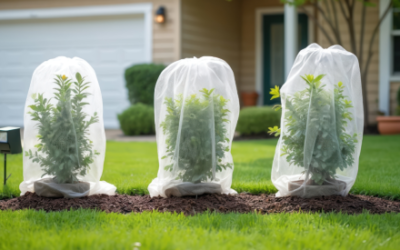As winter arrives and snow begins to cover the landscape, you may wonder how snow and ice affect your lawn. While winter weather can protect some elements of your outdoor spaces, it can also pose challenges that affect grass health, soil quality, and landscaping. In this post, we’ll clear up some common misconceptions and discuss how snow and ice affect your lawn during winter.
Myth 1: Snow Always Damages Grass
One of the most common misconceptions is that snow always harms your lawn. In reality, snow can have a protective effect. When snow blankets your lawn, it acts as an insulator, protecting the grass roots from harsh winds and extreme temperature fluctuations. This “blanket effect” can prevent grass roots from freezing solid and even shield them from damage during severe cold spells. However, issues can arise when snow is compacted, as we’ll discuss next.
Myth 2: Walking on Snow-Covered Grass is Harmless
While it may seem harmless to walk across a snow-covered lawn, doing so can actually damage the grass beneath. When snow is packed down, it compacts the grass and soil, which reduces airflow and can prevent water from reaching the roots. Compacted snow also encourages the formation of ice layers, which can suffocate the grass and promote fungal growth in the spring. To prevent this, try to avoid heavy foot traffic on your lawn during snowy months and use designated walkways if possible.
Myth 3: Snow Mold is Uncommon and Doesn’t Cause Significant Damage
Snow mold is more common than many people realize and can be quite damaging if not addressed. Snow mold is a fungal disease that thrives in damp, cold conditions, especially under snow that remains for long periods. Snow mold often appears as gray or pinkish patches on the grass when the snow melts. It can damage grass blades and inhibit spring growth, so it’s important to take preventive measures, such as raking leaves and debris off your lawn before snowfall to reduce the risk of mold formation.
Myth 4: Ice Always Kills Grass
While thick layers of ice can be harmful, ice does not always kill grass. Brief icing over grass blades is usually not a problem, especially if the ice layer melts quickly. However, extended ice coverage or repeated freeze-thaw cycles can damage grass by blocking air and water access to the roots. To avoid this, avoid piling snow onto grassy areas, as compacted snow can turn into thick ice sheets that stay for long periods.
Fact: Salt and De-Icers Can Harm Your Lawn
One of the most damaging aspects of winter for lawns is salt or de-icing chemicals that are commonly used on roads and walkways. When salt-laden snow is shoveled or blown onto your lawn, it can seep into the soil, dehydrating grass roots and damaging soil health. Salt can also change the soil’s pH, making it more challenging for grass and other plants to absorb nutrients. To protect your lawn, consider using eco-friendly de-icers or placing barriers to keep salt and treated snow away from your grass.
Fact: Some Grass Varieties Are More Resilient to Winter Weather
Not all grass types respond to winter weather in the same way. Cool-season grasses, such as Kentucky bluegrass and fescues, are more resilient to colder temperatures and typically fare better during snowy winters. Warm-season grasses, like Bermuda grass and zoysia, tend to go dormant and may be more susceptible to winter damage, especially if exposed to repeated freeze-thaw cycles or heavy snow compaction. If you’re not sure which type of grass you have, consulting a lawn care professional can help you understand the best practices for protecting it over the winter.
Tips for Protecting Your Lawn from Snow and Ice Damage
Understanding how snow and ice impact your lawn is the first step. Here are some proactive steps to protect your grass during the winter months:
- Minimize Foot Traffic: Designate pathways and avoid walking on snow-covered grass to prevent compaction and ice formation.
- Rake Up Debris in Fall: Clear leaves and debris from your lawn before the first snowfall to reduce the risk of snow mold and ensure better air circulation.
- Limit Salt Exposure: Use eco-friendly de-icers on driveways and walkways, or install barriers to keep salt and treated snow away from your lawn.
- Avoid Piling Snow on Grass: Keep large piles of snow off your lawn, as they can compact grass and soil, creating conditions for ice formation and fungal growth.
- Consider Professional Aeration in Spring: If you notice compacted areas or snow mold patches, professional aeration can help restore airflow and promote healthy regrowth.
By following these tips, you can help your lawn endure the winter months and emerge healthier in the spring. Snow and ice can both protect and harm your lawn, depending on how they interact with grass, soil, and landscaping features. By understanding these dynamics and taking steps to reduce winter stress on your lawn, you’ll give your grass the best chance to thrive come spring. For tailored advice and professional support in maintaining your lawn’s health year-round, reach out to Jack’s Lawn Care & Landscaping. Our team is equipped to help you protect your lawn from winter damage and ensure it’s ready for a fresh start in the growing season.



